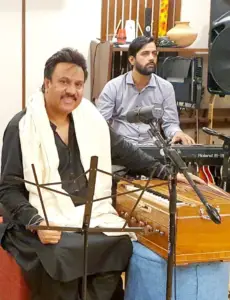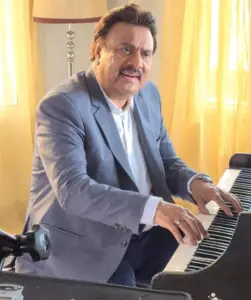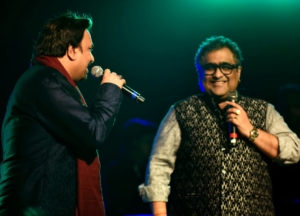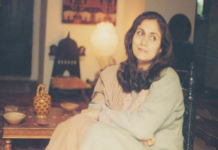Ghazal singer Muhammad Ali has been associated with classical music for almost thirty years. A lively person and a good conversationalist, Muhammad Ali has in his voice, a tincture of the likes of Mehdi Hassan, Ghulam Abbas and Parvez Mehdi. Hailing from a Lahore-based family of musicians, Muhammad Ali resides in Karachi and has exhibited his talent in more than thirty countries all over the world. He has succeeded in establishing his name amongst music connoisseurs, including those belonging to India where good music is never compromised on. These days, his rendition of Mehdi Hassan’s highly popular filmy song “Tere Bheege Badan Ki Khushboo” released by Sufiscore is trending among the top hundred music videos, his name and voice going places and bewitching people’s minds and hearts. Talking about his career stretching over three decades, the singer says:
“I learnt music from home. My father, uncle and brother were associated with the filmy music industry, my brother being a singer who helped me a lot in learning the technicalities of ghazal singing. I also received training from Ashiq Ali Khan. However, the person who has inspired me the most is Mehdi Hassan. All the knowledge that I have gained about the nuances of the genre of ghazal has been the result of my consistent listening to Mehndi Hassan’s ghazals. The genre demands a different understanding of music altogether, and a different temperament as well. Ghazal singing requires a lot of patience, employing which I have managed to learn the dos and don’ts of this genre.”

It comes as a surprise that for this singer, the question regarding the domination of ustaad gharaanas (Music masters’ families) over the field of classical music is quite an interesting one, to which he answers in the following words:
“I don’t believe that any family dominates over music. Instead, I believe that they really wish to propagate classical music and want the youngsters to work in the genre. But when no one shows interest, the question of their domination itself disappears. Whenever a good singer will come to the fore, he or she will be admired. There are quite a few ghazal singers who do not belong to any such family yet are respectable names in the field of classical music, such as Faheem Mazhar, Qamar uz Zaman, Badar uz Zaman and Pervez Butt. I believe that learning music has more to do with being emotionally connected to it, and receiving its training with utmost sincerity and hard-work. Ghazal singing, specifically, has a lot to do with presentation as well, which I believe is something the youngsters lack. Otherwise, there are so many singers who have taken forward the style of their ancestors and have kept their way of presenting ghazals before the audience intact. People not only listened to Nusrat Fateh Ali Khan and Salamat Ali Khan but used to fall into a trance. This is something which at least I haven’t had a chance to witness in any of the contemporary singers. If one is to talk about classical music families’ domination, then the families’ attachment with music and their earnest training in it must also be brought under consideration.”
There is a dearth of ghazal admirers, and also comparatively lesser incentives for the ghazal singers out there while a lot of hard-work goes into it. Then why did you choose this field?
Until a few years ago, things did not seem to be very conducive for the classical singers as very few events would be held, not yielding the kind of result the singers’ hard-work deserved. But I believe that the situation has started changing for the better now. Talking about my interest specifically, I felt that my voice suited the genre of classical music, and that’s why of all the genres, I went for classical. Voices have a lot to do with genres. There are voices that are filmy and therefore acquire huge success by serving as playback voices for heroes and heroines. Initially, I did go for light music but times changed and pop singers like Alamgir, Sheiki, Hassan Jehangir, Ali Haider, Ali Azmat and Junaid Jamshed took over the music scene with a different style of music altogether. Then Ata Ullah Esa Khelwi’s “Kameez Teri Kaali” became famous and other singers followed suite, making it seem as if music would continue to be made in the same manner for all the years to come. Nusrat Fateh Ali Khan, thereafter, emerged with a style of his own and once again, unparalleled admiration developed for the kind of singing style he brought. There was a time when it seemed that the likes of Mehdi Hassan, Ghulam Ali and Pervez Mehdi have completely disappeared, and forever. However, it was with the entry of Shafqat Amanat Ali that classical singing was revived and people redeveloped an interest in the genre. Over time, a lot of music genres have reigned over the music scene but classical music dominates and surpasses every other genre.

There was a time when you made a singing band of your own. Where did that go?
Yes, it was in 2003 that I initiated my band by the name of Suroor, which grew quite popular. I made fusions of classical and pop music, which people really admired and we kept on making such songs for almost ten years. Lately, we have lessened our work. However, a recent music production of ours by the name of Jamhooriyat gained a lot of appreciation in which Javeria Saud, Sana Fakhar, Hira Mani and Ayesha Omer performed along-with us. We also recorded songs for our home production film, Kahay Dil Jidhar. Apart from that, I have sung for several commercials, television dramas and films.
Why did you stop singing for films?
To be honest, I started feeling as if I am not doing justice to film songs. Back then, Lahore’s recording studio did not have the kind of facilities it has now while Karachi had great studios even at that point in time. Then is happened that Lahore’s film industry collapsed. My ghazal singing, however, continued because it has always been my first love when it comes to music and has always given me peace and comfort. I have remained somewhat eclipsed because I do not yearn for popularity and haven’t ever run after money. I also avoid visiting our morning shows and singing for them because I don’t believe that they take music as much seriously as they should. I want to do serious classic music and I will continue to do it, even if only at a personal level.
You have sung several renditions of Mehdi Hassan’s songs. Is it because you have practiced his ghazals well, or because people like to listen to Mehdi Hassan in your voice?
Well, I have sung a lot of pieces other than that, but unfortunately, our television shows do not give singers a chance to bring something new that they have worked on. In every show based on classical music, we are required to sing Mehdi Hassan only, which is also a parameter to judge how well one knows classical music. One isn’t considered a classical singer unless one covers Mehdi Hassan’s ghazals. This is one major reason, apart from my own liking for the ghazal maestro, that I have sung him a lot.

You have visited India a lot. Do you think Indians understand and admire classical music a lot?
I have made a dozen visits to India and performed along-with Arijit Singh in a show the last time I went there. Indians really admire the genre of classical music, especially ghazal. Actually, they are taught to listen to music with proper manners and respect. However, I don’t think their understanding of it is better than Pakistanis. It is only the perception that matters, and our people are not taught how to imbibe good music the way it should be imbibed. Indians have a way of respecting and promoting music which makes them seem good at it.







